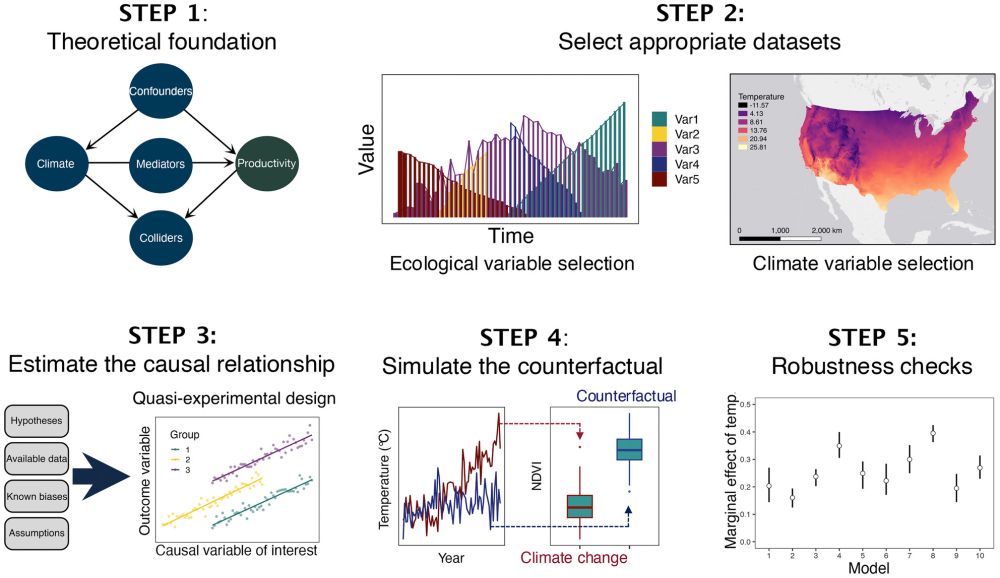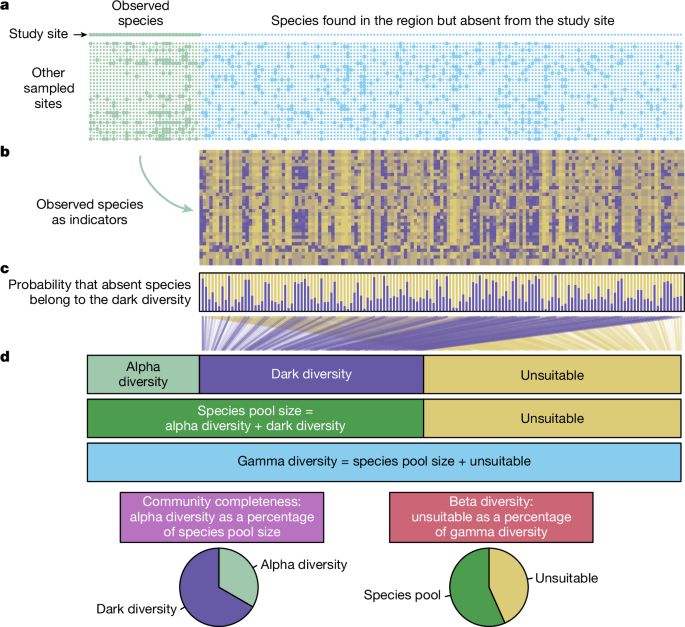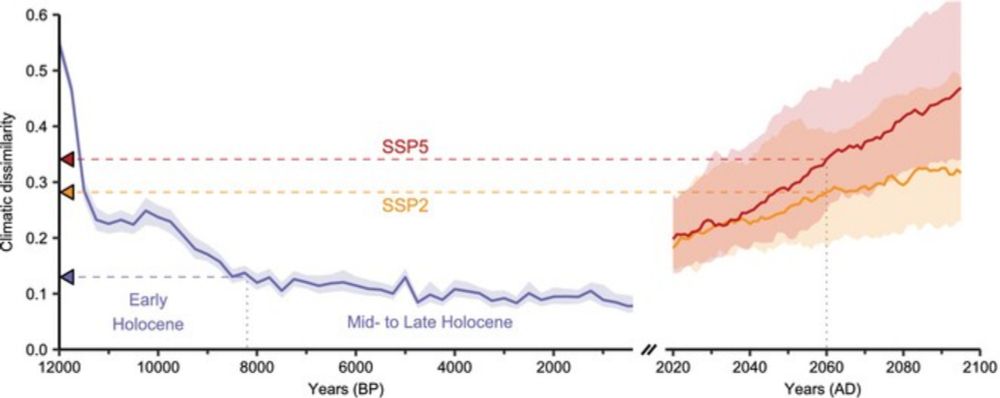The DNA pioneer is Rosalind Franklin.
07.11.2025 21:15 — 👍 256 🔁 119 💬 3 📌 2

alt="Schematic of a graph of a population trajectory for blue tits that is known for half of the x-axis (time) and then forecasted with uncertainty. Above the population trajectory are some weather images (a sun and some rain) they have connections to the population size but the path is unknown. "
PhD advert alert!
Come work with me at Edinburgh.
I'm advertising a PhD on: "Predicting responses of birds to climate change", competition funded through the E5 DTP. Would suit those with an interest in predicting responses to climate change, birds, or both.
e5-dtp.ed.ac.uk/project?item...
22.10.2025 12:57 — 👍 3 🔁 8 💬 0 📌 0
À Rafah il y a deux jours : Israël continue de détruire des maisons palestiniennes bsky.app/profile/anti...
22.10.2025 07:16 — 👍 48 🔁 43 💬 1 📌 3
Thanks to people that contributed to this huge database, and my collaborator's! The two I have found here @andrewhacket-pain.bsky.social , @micbog.bsky.social and of course those that are missing , D. Kelly, J. Foest, I. Oberklammer, M. Pesendorfer, A. Satake, K. Kondrat, J. Szymkowiak, I Pearse
20.10.2025 04:34 — 👍 1 🔁 0 💬 0 📌 0
Of course this is the first step, more need to be done for example to understand how plants can perceive environmental cues. And this is what we are doing (:
For now, our study provides the first global synthesis of weather–reproduction relationships in perennial plants!
20.10.2025 04:34 — 👍 1 🔁 0 💬 1 📌 0
This means that climate change will affect better reproduction ! Warmer conditions in temperate areas mean that reproductions might be more constant . Whereas in the tropics, if cold weather is too rare then we could expect more failure of reproduction! 🚦
20.10.2025 04:34 — 👍 1 🔁 0 💬 1 📌 0
But temperature acts differently according to regions. Trees growing in boreal and temperate regions require warm summer and spring. Whereas in the tropics, plants need cold temperatures.
20.10.2025 04:34 — 👍 0 🔁 0 💬 1 📌 0
Temperature is the main dominant driver related to seed production. Other matters , but to a lower extent
20.10.2025 04:34 — 👍 0 🔁 0 💬 1 📌 0
🌳🌲So here is what we did, we look at important weather relationships to seed production using the largest open database , MASTREE+. We analysed more than 300 plant species, using moving windows analysis. And here is what we found:
20.10.2025 04:34 — 👍 0 🔁 0 💬 1 📌 0
For example in European beech trees , we know that previous summer temperatures are super important and can trigger reproduction. But what about the other species ?
20.10.2025 04:34 — 👍 0 🔁 0 💬 1 📌 0
In most perennial plants (like trees), we can observe years with heavy crops when many seeds will be produced. This phenomenon is called mast seeding or masting, and has huge implications ( food web, adaptation because without seeds no new generation etc). And it is related to weather
20.10.2025 04:34 — 👍 1 🔁 0 💬 1 📌 0

Picture of Japanese pine
Happy to share our last study published in @natcomms.nature.com
We asked
Can the weather tell trees when it’ is time to reproduce?
www.nature.com/articles/s41...
20.10.2025 04:34 — 👍 5 🔁 3 💬 1 📌 0
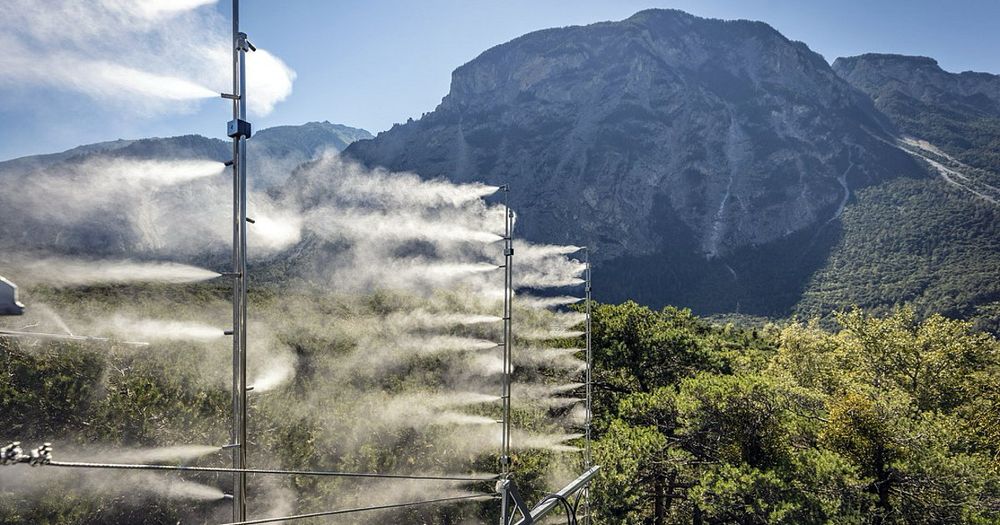
New PhD position in Plant Ecophysiology🌳 Study how atmospheric & soil drought shape tree carbon & water relations at the VPDrought experiment in Switzerland. Start Jan 2026. Apply here: m.refline.ch/273855/1759/... @wslresearch.bsky.social
20.08.2025 12:38 — 👍 54 🔁 59 💬 1 📌 1
Forest Biology Center - Adam Mickiewicz University in Poznań, Poland
Centrum Biologii Lasu Uniwersytetu im. Adama Mickiewicza w Poznaniu
🚨 Postdoc opening 🚨
Join us at Forest Biology Center (Poznań, Poland) to study forest ecology under climate change.
2-year contract (extendable), start Jan 2026 (flexible). Apply by Sept 30, 2025.
🔗 forestbiologycenter.amu.edu.pl/our-team/joi...
19.08.2025 09:32 — 👍 10 🔁 13 💬 0 📌 1
Ce que les soc-dem appellent "casseurs" sont fort probablement des manifestant.e.s comme les autres qui protègent des violences de la police, qui s'attaquent aux symboles d'un capitalisme qui nous tue collectivement et mettent hors d'état de nuire des activités destructrices.
06.07.2025 17:20 — 👍 296 🔁 60 💬 10 📌 4

Check out our latest blog post!!
Xiaojie Gao gives us the story behind their paper and the newly published pnetr R package, used for forest ecosystem modelling 🌳 Read the blog post here 👇
buff.ly/oKTtoJh
19.06.2025 11:02 — 👍 5 🔁 3 💬 0 📌 0
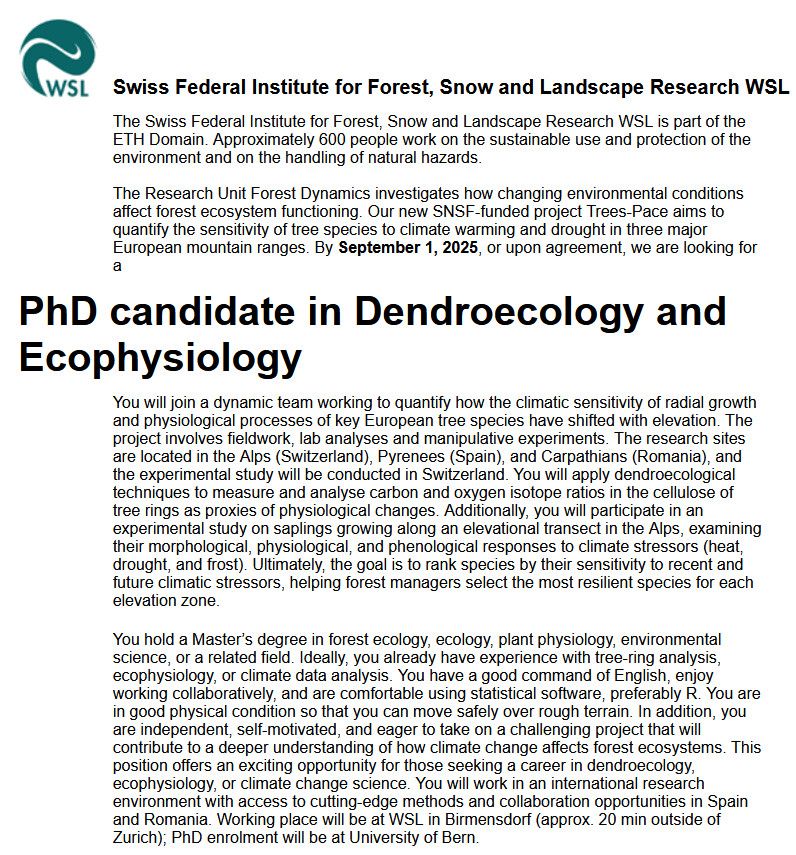
PhD candidate in Dendroecology and Ecophysiology
The project involves fieldwork, lab analyses and manipulative experiments. The research sites are located in the Alps (Switzerland), Pyrenees (Spain), and Carpathians (Romania), and the experimental study will be conducted in Switzerland. You will apply dendroecological techniques to measure and analyse carbon and oxygen isotope ratios in the cellulose of tree rings as proxies of physiological changes. Additionally, you will participate in an experimental study on saplings growing along an elevational transect in the Alps, examining their morphological, physiological, and phenological responses to climate stressors (heat, drought, and frost). Ultimately, the goal is to rank species by their sensitivity to recent and future climatic stressors, helping forest managers select the most resilient species for each elevation zone.
You hold a Master’s degree in forest ecology, ecology, plant physiology, environmental science, or a related field. Ideally, you already have experience with tree-ring analysis, ecophysiology, or climate data analysis. You have a good command of English, enjoy working collaboratively, and are comfortable using statistical software, preferably R. You are in good physical condition so that you can move safely over rough terrain. In addition, you are independent, self-motivated, and eager to take on a challenging project that will contribute to a deeper understanding of how climate change affects forest ecosystems. This position offers an exciting opportunity for those seeking a career in dendroecology, ecophysiology, or climate change science. You will work in an international research environment with access to cutting-edge methods and collaboration opportunities in Spain and Romania. Working place will be at WSL in Birmensdorf (approx. 20 min outside of Zurich); PhD enrolment will be at University of Bern.
🌲🖥️ #PhDAlert! MSc in a #natural #science & experience with #tree-ring analysis and statistical software (R)? Fluent in English and ready for #fieldwork? Our #forest dynamics #research unit is looking for a #PhD candidate in #dendroecology and #ecophysiology! apply.refline.ch/273855/1736/...
14.05.2025 08:13 — 👍 26 🔁 27 💬 0 📌 2
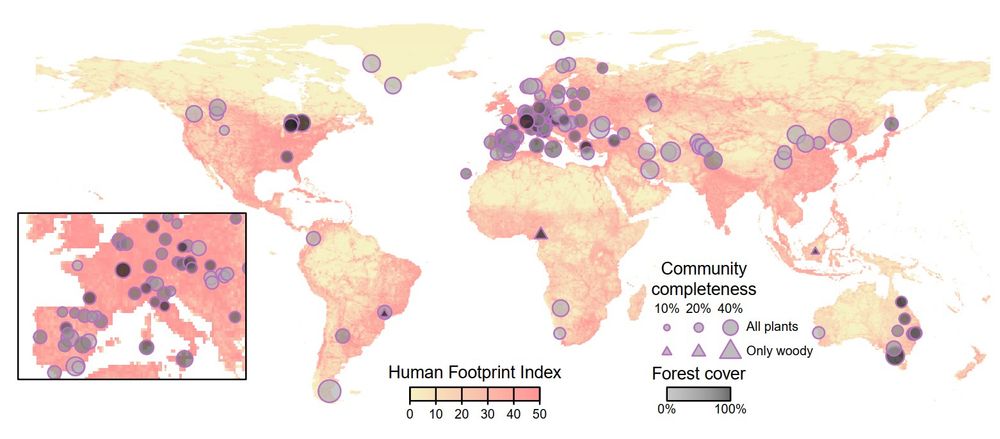
🌿 The first article of our DarkDivNet consortium, led by Meelis Pärtel, has been published in Nature. Our dataset from 5500 sites in 119 world regions, collected specially for this purpose, shows that plant diversity is negatively affected not only by direct human impact such as local disturbance.
02.04.2025 19:48 — 👍 45 🔁 22 💬 1 📌 3
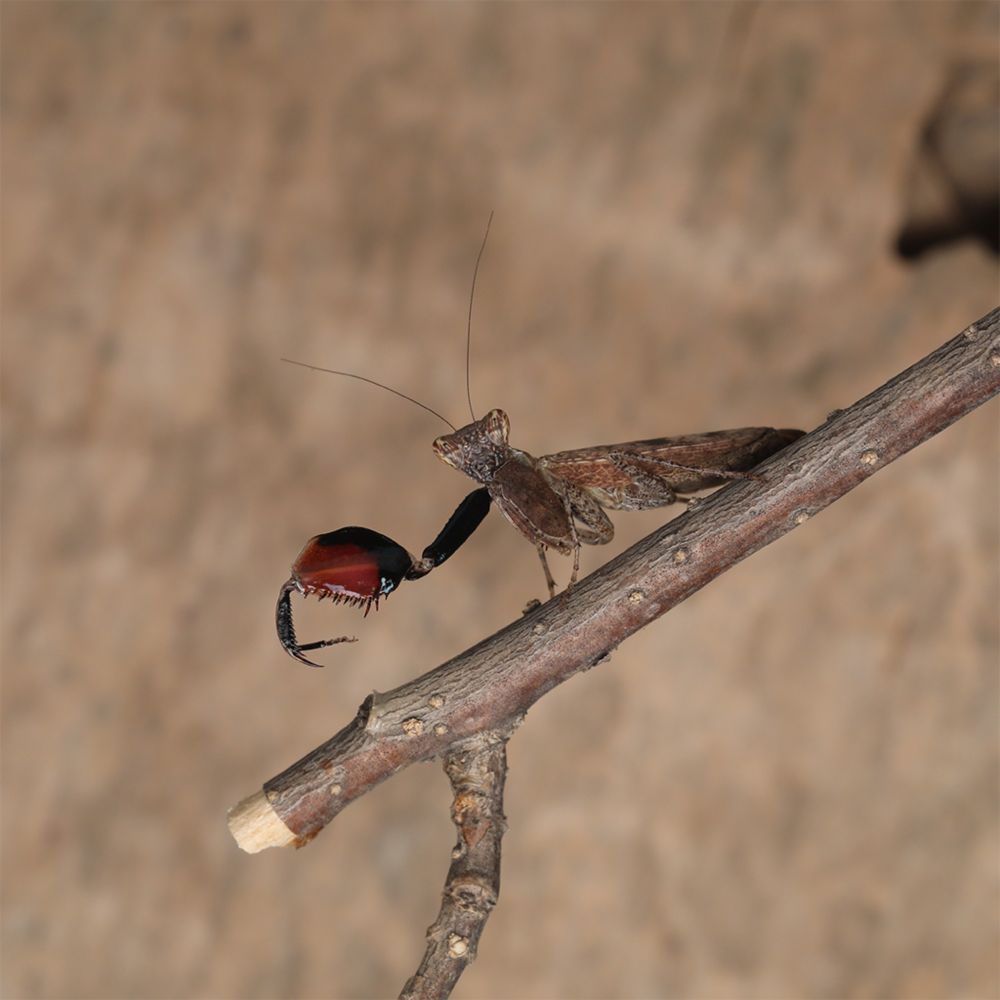
Six-decade research bias towards fancy and familiar bird species | Proceedings of the Royal Society B: Biological Sciences
Human implicit biases towards visually appealing and familiar stimuli are well documented
and rooted in our brains’ reward systems. For example, humans are drawn to charismatic,
familiar organisms, bu...
"from 1965 to 2020, nearly half the variation in publication trends among 293 North American male passerine & near-passerine birds was explained by 3 factors subject to human bias: aesthetic salience (visual appeal), range size (familiarity) & number of universities within ranges (accessibility)"
02.04.2025 07:28 — 👍 39 🔁 17 💬 1 📌 0
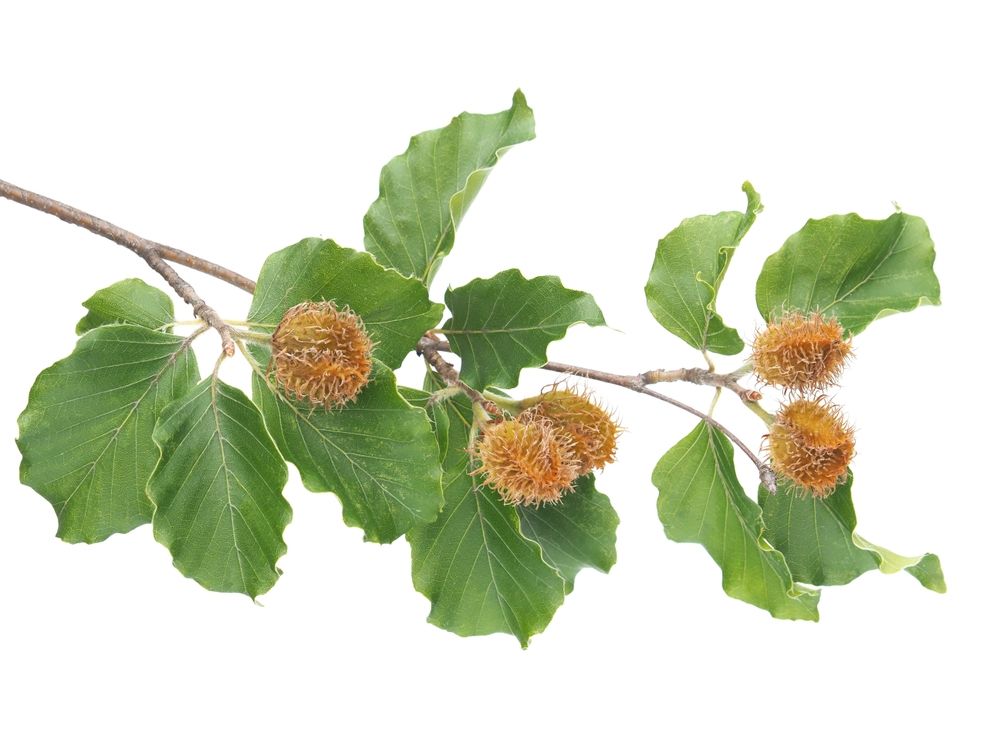
Branch of beech tree, Fagus sylvatica, with nuts and green leaves.
Warmer summers are causing European beeches to produce seed more often, depleting the trees’ stored resources—an indirect effect of climate change that is threatening the sustainability of Europe’s most widespread forest tree. In PNAS: www.pnas.org/doi/10.1073/...
11.02.2025 16:31 — 👍 24 🔁 14 💬 0 📌 1
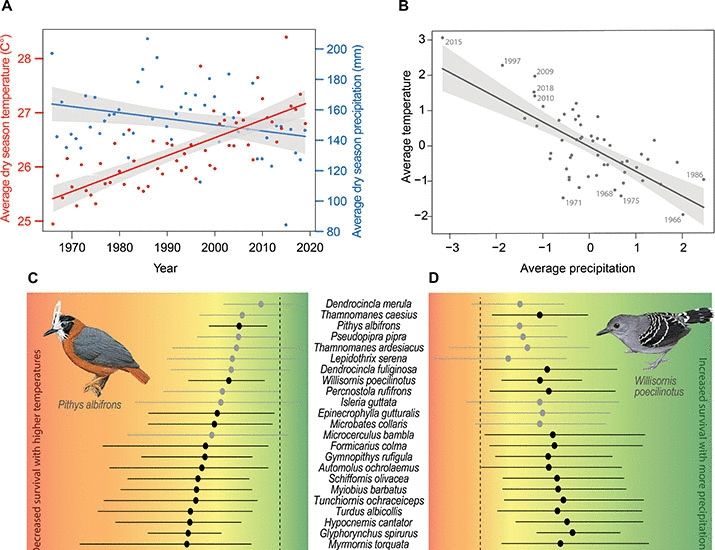
Climate change aggravates bird mortality in pristine tropical forests
Climate change threatens Amazon rainforest birds, with harsher dry seasons significantly affecting their survival over 27 years.
Papers like this really underscore the importance of long term monitoring datasets for understanding climate change impacts on biodiversity... And highlight the dire consequences of even modest temperature increases. 🧪🌍🦤🦜
www.science.org/doi/10.1126/...
31.01.2025 18:03 — 👍 144 🔁 56 💬 4 📌 1

Our paper that showed alternations in masting patterns are leading to growth decline in European beech is now in @PNASNews, as a part of highlighted content; check out that summary! :)
Funded by @NCN_PL
www.pnas.org/doi/10.1073/...
04.02.2025 17:25 — 👍 3 🔁 4 💬 0 📌 0
Interested by tree growth, resources allocation and climate change? Have a look in our last study! We showed how tree reproduction is impacting tree growth,. AND... not only drought is responsible of a growth reduction 🤯
07.02.2025 18:39 — 👍 1 🔁 0 💬 0 📌 0
My point was some harassment issues by W. Jetz, not you or your work.
16.01.2025 19:30 — 👍 0 🔁 0 💬 0 📌 0
Did Walter Jetz presented his own work or the work he had stolen? Did he presented his own work or the work from his postdoc and PhD that he was bullying? michaelbalter.substack.com/p/anatomy-of...
16.01.2025 07:57 — 👍 0 🔁 0 💬 1 📌 0
Tree enthusiast, forest geneticist, climate scientist, runner. Professor, University of British Columbia.
Experimental forest of the @univbordeaux.bsky.social
#research #openscience #urbanforest
https://linktr.ee/forest_ub
Climate scientist studying drought, land surface processes, climate extremes. https://www.drbenjamincook.net/
Conservation scientist @uq-cbcs.bsky.social committed to overcoming biases and barriers in conservation and science. See
http://translatesciences.com
http://kaizenconservation.com
he/him
Peer-organised workshops for PhD-, MSc- and BSc- students in Ecological Modelling. We nurture a community among scientists of the future!
Working group of the GfÖ
Assistant Professor @oistedu.bsky.social. Microbial Ecologist, Ecosystem Ecologist, and Mom of two🦠🍄🌏🌳🍃👩🔬
https://www.oist.jp/research/research-units/mee/chikae-tatsumi
Plant ecophysiologist & biogeochemist | Asst Prof + RI-RS URF @ Trinity College Dublin (@psb-trinity.bsky.social) | Focus: functional ecology, C, water & nutrient cycles, roots, phenology & scaling tech | linktr.ee/richardnair 🌏🌿🫚🖥️
The International Biogeography Society. Fostering collaboration, awareness of & education in biogeography, for the study & conservation of the world's biota.
https://www.biogeography.org/
Okinawa Institute of Science and Technology: https://www.oist.jp
沖縄科学技術大学院大学: https://www.oist.jp/ja
🌳 Plant ecophysiologist 🌳 | Heat and drought impacts | Professor at EPFL | Group leader at WSL, Lausanne, Switzerland 🇨🇭 | she/her https://www.epfl.ch/labs/perl/
Ecosystems, climate and the carbon cycle.
Prof. of Ecosystem Dynamics @ESPM_Berkeley @eesalbnl
Chief Scientist @EarthshotLabs
Director @fluxnet_coop
3xDad
Chercheur en neurobiologie.
Compte personnel.
#neurosciences #neurobiologie
Led by Prof. Ingolf Steffan-Dewenter, we’re the 🐝-hive of biodiversity research at the University of Würzburg’s Biocenter, Germany 🇩🇪 From buzzing tropical forests to European farmlands, we decode how climate and land use changes shape the web of life.
@Ox.ac.uk @Intelligentearth.bsky.social DPhil Student. Studying grey seal population ecology using UAV imagery @Mcem-oxford.bsky.social and @Salgoteam.bsky.social
https://mcem.web.ox.ac.uk/people/thomas-stone
PhD Student at University of Queensland studying language barriers in science in Japan | Aquatic ecologist and invasive species biologist | Passion for travel, language, and intercultural experiences | 🗣️🇬🇧 🇯🇵 🇰🇷 🇫🇷
Tree-ring lover. RyC fellow at Uni Barcelona, Vice president of the
Association for Tree-Ring Research (ATR).
Computational ecologist at UVM studying biodiversity responses to global change
Australian National University. Macroevolution, macroecology, biogeography, biodiversity, conservation.
www.macroevoeco.com
Forest ecologist. Passionate about studying how forests respond to climate extremes. Postdoc www.selvalab.org @bristoluni.bsky.social




